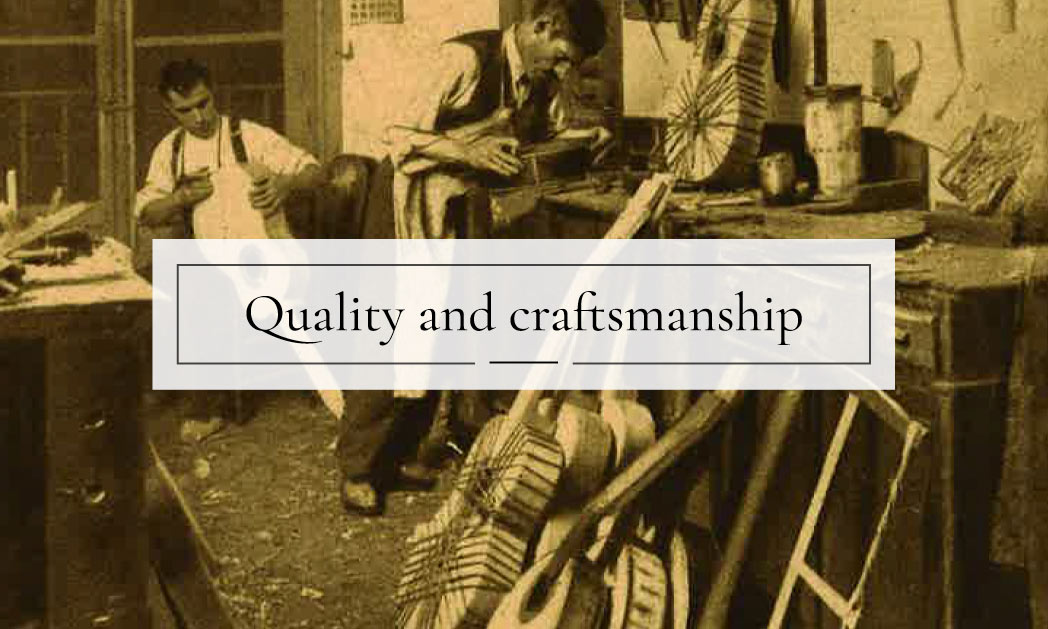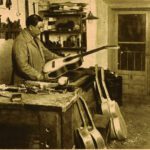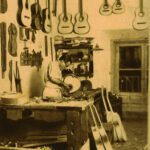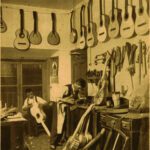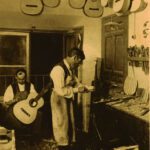On some labels and stamps of my great-grandfather José Ramírez I and my great-granduncle Manuel Ramírez, the name of guitar factory appears. This makes sense if we take into account that the word factory comes from the latin factory, which means art or craft, artisan work and also artisan workshop.
Evolution of Guitar Factories and Workshops
The only difference between a workshop or factory and another workshop or factory is the quality of the work done by one or the other. In fact, chain production was already carried out then, with a very rudimentary technology still used in the seventies in some places, like the one my brother José Enrique visited to see, with astonishment, how they piled the tops, one over of the other, with the bars and braces newly glued so that some of them leaned inexorably with the pressure and others moved, and stayed that way.
They treated guitars as furniture, and not as musical instruments. Fortunately, that has also changed.
And returning to the distance that has been produced between factories and workshops, we must take into account that the evolution of technology has meant that factories have moved away from workshops as they have a very different infrastructure from that used in an artisanal workshop, as those of my ancestors were and as ours continues to be today.
Now there is a substantial difference. In factories, more or less sophisticated machinery is used for multiple and chain production (which some call “line” to avoid the word “chain”, we don’t really know why, since there is nothing wrong with being a factory), while in the workshop, artisanal work is carried out piece by piece.
Quality and Craftsmanship Considerations
Although in factories, during the process of making and assembling a guitar, there are phases in which the human hand has to intervene -which are the least- each guitar goes through different operators, each specialized in the use of each machine and in each phase of the process until the end. In this way, no one knows the complete process of making the instrument, but rather the part in which they are specialized. And although the quality of many factories is good, it is not craftsmanship, therefore, it is not what is considered a workshop today, where each guitar is entirely built by the same person throughout the entire process.
It must also be added that believing that a guitar just because it was built by hand is better than one that was made in a factory is a mistake. There are artisan guitars which quality is much lower than others made in factories. Because there are workshops and workshops, factories and factories. Therefore, it is not about distorting the reality of both things as if one were better than the other, they are simply different, with different functions and are not comparable. Each one has its space and its purpose, equally valid depending on its objective.
As long as there is quality, both options are legitimate, so for those who are starting to play the guitar, it is most advisable to choose a factory-made studio guitar because it has a more affordable price, while if the goal is a commitment that requires a higher level, the next step would be to access a quality handcrafted guitar. In fact, professional concert players do not usually choose mass-produced guitars, but rather those that have been built by a craftsman who masters all the steps of the process and takes care of every detail from start to finish, unless they want to amplify it, which then they would choose a factory guitar where they can install and equipment that involves drilling the instrument.
When my father, José Ramírez III, expanded his workshop by teaching the trade to several young people to become journeymen, because he wanted to respond to a great demand for his guitars, it began to be said that his workshop was actually a factory -according to the current concept. , it is understood – which is totally false, since in that workshop each journeyman built each guitar from beginning to end.
Each journeyman was responsible for carrying out their tasks in the traditional way, sometimes helped by apprentices, which in turn was part of their training to become journeymen one day if they demonstrated the necessary skill. And that’s how we continue to work today. And that’s how we have always worked. I include here some photographs from 1927 of our workshop where you can clearly see this indisputable fact:
I also want to point out that there are those who consider that the artisan is the one who carries out his work from start to finish, and once his work is finished, he signs it. That is also false, because always, both in art workshops and in artisan trades, there is a master, and his disciples, apprentices and officers help him in the realization of his work that the master signs as the final touch, thus guaranteeing the quality of work and their responsibility for it. I like to give as an example what, in addition to being an architectural work, is a work of art: La Sagrada Familia, in Barcelona. No one questions that its author was Gaudí, who of course signed his design, his plans and his instructions, and although a century has passed since his death, his work is still being built today.
In this world of the guitar, things get complicated when the commercial interests of some who, without being either factories or workshops, lacking any ethics, dedicate themselves to giving opinions, crowning themselves as the only possessors of the truth, making up the words to achieve an commercial purpose at the cost of discrediting the other or detracting from his value to impose their criteria which, depending on whether the wind blows in favor or against their convenience, changes course by contradicting themselves without any shame, in order to sell what they are interested in, in every moment. This procedure is defined as unfair competition. But that’s another story.
Our advice to the sailor is that, when choosing a guitar, it is best to pay attention to the true experts on the subject, who are the manufacturers and craftsmen, the owners of their own history and tradition, who produce and create unlike those who only have the word as a tool to earn a living with what others produce and create.
Amalia Ramirez Madrid.
February 26th, 24.

